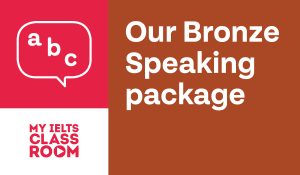
The 5 worst pieces of advice for the IELTS speaking exam!
The role of any teacher is to help their students maximise their exam scores. However, over the years Nick and I have noticed that many teachers are giving advice for the IELTS speaking exam that could actually harm their scores not improve them. Obviously, this is not intentional, but it can be difficult as an examiner to sit and watch a student put into practice “techniques” that they have been given by a teacher, knowing that they could have reached a higher score if they had just responded naturally to the questions.
So, in today’s episode, join Nick and I to find out what the 5 worst pieces of advice for the IELTS speaking exam are, and why you should ignore them!
Below, you can find a summary of the episode, which includes all of the links to useful materials and the times of each part of the discussion (so you can go directly to the part you want to listen to) 🚀
- Subscribe to My IELTS Classroom podcast on Apple podcasts here
- Subscribe to My IELTS Classroom on Google podcasts here
- Become a Patreon to gain access to extra BONUS episodes here

The 5 worst pieces of advice for the IELTS speaking exam!
Unlike writing, the IELTS speaking exam requires relatively little specific preparation. In fact, I would say that very strong speakers would need almost no preparation at all beyond a basic understanding of the format of the test and some practice of speaking continuously for two minutes without interruption.
Why? Well, very simply because the IELTS speaking descriptors have been designed to reflect the way that strong speakers actually talk.
In writing, you will need to learn how to have a clear position throughout your essay, or to have a clear tone in a letter, or to identify key features in a report. These are not necessarily difficult to do, but they are not intuitive and even native speakers can fall short if they fail to prepare.
However, in speaking, all you really need to do is answer the questions you are given directly and naturally. Nothing more, nothing less. That is why it can be so disheartening as an examiner when a student walks into the test room and puts into practice very poor advice for the IELTS speaking exam.
I am 99.9% sure that this advice was given to them by a teacher in order to “hack” the test, but the result is always the same:
a score that is much lower than the student deserves.
The worst thing is that, as an examiner, there is nothing you can do to stop this happening. All you can do is sit still, listen, and feel sorry for the student who is unintentionally damaging their score.
However, today Nick and I are not examining; we are teaching. And that means that we are free to share the 5 worst pieces of advice for the IELTS speaking exam.
- Using 2 sentences for every answer in Part 1 (particular if you use because)
- Trying to force complex grammar into every answer even when it doesn’t belong
- Trying to force idioms / proverbs into every answer
- Starting every answer or sentence with a linking phrase
- Using the PPF method in Part 2
What I have written above is simply a list, so to hear why these “tactics” are so damaging and what you should do instead, you will need to listen to the episode.
How many sentences should you use in Speaking Part One? Watch this video to find out!
Would you like expert help to improve your IELTS speaking score?
We offer a 5-day intensive course for IELTS test-takers every month that covers all aspects of speaking, from how to approach each section to how to paraphrase well or address the most difficult questions in Part 3. Even better, with every course being run by an ex-examiner, you will be getting feedback is guaranteed to help you to improve your score. You can read more about the course here.

